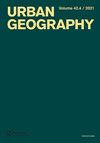The role of the diaspora: malaga, vā, and contesting the financialization of customary land in Samoa
IF 2.6
2区 经济学
Q1 GEOGRAPHY
引用次数: 1
Abstract
ABSTRACT The settler colonial city has been described in relative isolation, detached from the global metropole, intent on internal enrichment through the deterritorialization of Indigenous people. This urban formation deploys familiar spatial techniques: legal borders, economic regions, and segregated enclaves. Yet for many Indigenous peoples, the relationship to land is not juridical, economic, nor socio-racial, it is genealogical. These genealogical ties to land extend the boundaries of settler-colonialism – and resistance to it – beyond the islands, across diasporic space. Decolonial Pacific studies describe a geography resistance to land reform among Indigenous and immigrant Pacific Islanders which exceeds and overspills the settler colonial city. Diasporic space – moving through and overspilling the settler colonial city – is the spatial context for understanding resistance to customary land reform in Samoa and the struggles of other Pacific Islanders against settler colonial processes of dispossession.侨民的作用:马拉加、vā和对萨摩亚传统土地金融化的质疑
移民殖民城市被描述为相对孤立的,与全球大都市分离,意图通过土著人民的非领土化来实现内部充实。这种城市形态运用了熟悉的空间技术:法律边界、经济区域和隔离的飞地。然而,对许多土著人民来说,他们与土地的关系既不是法律上的、经济上的,也不是社会-种族上的,而是宗谱上的。这些与土地的宗谱联系延伸了定居者殖民主义的边界——以及对它的抵抗——超越了岛屿,跨越了流散空间。非殖民化的太平洋研究描述了土著和移民太平洋岛民对土地改革的地理阻力,这种阻力超过了殖民城市的定居者。散居空间- -在移民殖民城市中流动并溢出- -是理解萨摩亚对惯常土地改革的抵制和其他太平洋岛民反对移民殖民剥夺过程的斗争的空间背景。
本文章由计算机程序翻译,如有差异,请以英文原文为准。
求助全文
约1分钟内获得全文
求助全文
来源期刊

Urban Geography
Multiple-
CiteScore
7.60
自引率
10.50%
发文量
104
期刊介绍:
Editorial Policy. Urban Geography publishes research articles covering a wide range of topics and approaches of interest to urban geographers. Articles should be relevant, timely, and well-designed, should have broad significance, and should demonstrate originality.
 求助内容:
求助内容: 应助结果提醒方式:
应助结果提醒方式:


